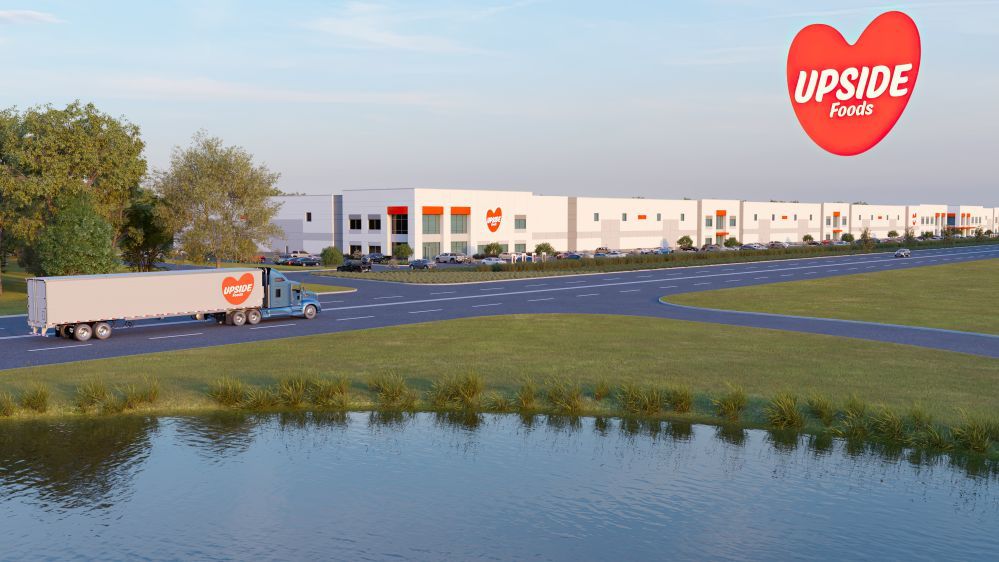UPSIDE Foods aims to break ground on a commercial-scale cultivated meat facility in Glenview, Illinois, later this year that will become operational in 2025.
Supported by a $140 million investment from UPSIDE Foods — which has raised $608 million since it was founded in late 2015 — the site will have an initial capacity of millions of pounds of meat and the potential to expand to over 30 million pounds.
UPSIDE Foods has been cleared by US regulators to make ‘whole-cut’ or ‘structured’ cultivated chicken products made with cells that have differentiated and matured into meaty tissue, which it currently makes on a tiny scale in two-liter flasks at its ‘EPIC’ production facility and innovation center in Emeryville, California.
This generates enough product to sell at Dominique Crenn’s upscale Bar Crenn restaurant in San Francisco. However, the whole-cut process is not yet scalable, acknowledges the startup, which is still waiting for regulatory approval to sell ‘unstructured’ or ground products such as nuggets made via a more scalable process that combines plant-based proteins and cultivated cell biomass grown in far larger bioreactors.
‘The unit economics look attractive’
The new plant in Glenview — dubbed ‘Rubicon’ — will start by producing ground cultivated chicken products, with plans to expand to other species and whole-textured formats in the future.
It will have a range of bioreactors going up to 100,000-liters and will have “attractive unit economics,” UPSIDE Foods COO Amy Chen told AgFunderNews.
“The design basis for Rubicon when you think about the scale which we’re talking about, the unit economics look attractive. But a lot still has to happen, right? The supply chain has to be built around it, the cells need to be very productive, we need to have the media components and the ecosystem of suppliers to be able to scale not only to the 1,000s of pounds but to tens of millions of pounds, so a lot of the work that’s being done in the background is around building that ecosystem.”
UPSIDE picked Glenview, IL, due to its strategic location from a logistics and distribution perspective, its pro-innovation business environment, and its skilled workforce, said Chen, who said the 187,000 sq ft plant is expected to create at least 75 new jobs.
Asked whether the company’s current funding will enable it to get all the way to 30 million pounds of capacity for its meat, she said: “We have enough [capital] to get it going and then actually to build a meaningful amount towards that full 30 million capacity, so at least the first few phases.”
Cell culture media
She added: “There’s a lot of work that goes into designing a facility at the scale of Rubicon. So a lot of that right now is on ensuring that processes can scale up, that we understand the engineering elements and design characteristics that are required to move to even larger scale. So our large [2,000-L] cultivators here [at the EPIC facility in Emeryville, CA] can simulate much larger scales when you look at things like osmotic pressure and shear force.”
Asked about progress on bringing down the cost of cell culture media, she said: “We’ve stated from the start that our goal and vision is to be animal component free. Our intention is to run large commercial processes animal component free, but we’ll continue to have processes that run in parallel with animal components and without.
“For growth factors [costly proteins that stimulate cell growth and differentiation], we’ve looked at it in a variety of different ways. One is sourcing, so finding low cost, high scale, high quality sources. Another [cost reduction tactic] is being able to select for cell lines less dependent on growth factors, so that’s been a big breakthrough for us as well.”

A pivotal year for cultivated meat
This is a pivotal time for the cultivated meat industry as startups face tough questions over the scalability of their technology and funding becomes harder to come by.
Eat Just’s GOOD Meat cultivated meat division — the first company to introduce cell-cultured meat to consumers — has faced lawsuits over alleged non-payment of bills, while founder Josh Tetrick has acknowledged that he will need to raise a significant new influx of capital to fund a commercial-scale plant in the US.
‘Conflicted’ carnivores: ‘They love the product [meat], but not the process [mass slaughter]’
As to the consumer appeal of cultivated meat, said Chen: “If anything, the demand for meat is continuing to increase. But we have conflicted carnivores. They love meat, and plant-based or other alternatives on the market are not good enough to cause them to change their habits. But they don’t feel great about eating meat. They love the product, but not the process. So what I think is really exciting about cultivated meat is that it resolves that paradox.”
Speaking at an event at Tufts University last year, UPSIDE Foods cofounder Dr. Uma Valeti acknowledged that early projections about the speed with which cultivated meat might gain market share were optimistic but noted that Rome wasn’t built in a day.
“It seems daunting and overwhelming when you think it could be 10, 20, 30 years [before cultivated meat really takes off]. But I don’t think that’s a long horizon at all when you think that meat [from slaughtered animals] has been around for thousands of years. Talk is cheap. So let’s prioritize action, and… take the constructive criticism, but keep moving forward. ”





